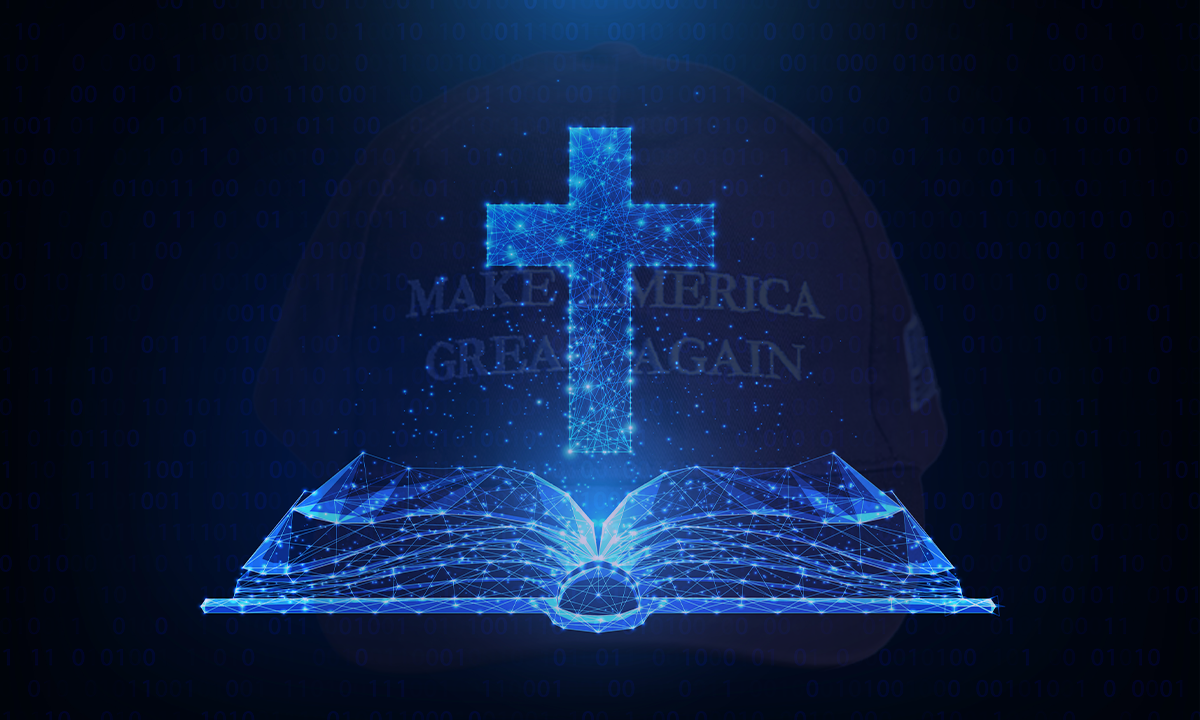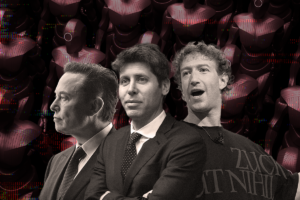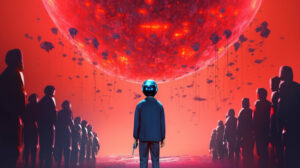Machine Learning MAGA: Rise of the Christian Cyborg
There are signs that the transhumanism of Elon Musk is merging with the traditionalism of Steve Bannon. (Graphic by Truthdig. Images sourced via Adobe Stock.)
(Graphic by Truthdig. Images sourced via Adobe Stock.)
The MAGA movement is not a monolith but a constellation of competing factions. It includes foreign policy hawks and non-interventionists, free-traders and protectionists. Another divide, which has received too little attention from the media, is between what could be called the traditionalists and the transhumanists.
MAGA traditionalists typically identify as religious. Some are evangelical Christians, such as Rep. Marjorie Taylor Greene of Georgia, while others like Vice President JD Vance and Steve Bannon claim to be Catholic. Traditionalists want their theological interpretations of the Bible taught in schools, abortion rights obliterated and trans people erased from our “Christian” society (there is no other word for this than “genocide”). They oppose immigration — except when it’s white South Africans — and many dabble in conspiracy theories about COVID, vaccine safety, the 2020 election and climate change. (Jewish space lasers, anyone?) Despite his obvious ignorance of Christianity, traditionalists support President Donald Trump because they see him as integral to establishing a fascist theocracy in the United States.
The transhumanists, in contrast, are a rather different bunch. Their cohort is much smaller, represented by Silicon Valley elites like Elon Musk. Unlike the traditionalists, they don’t have an army of millions in MAGA, yet they wield an outsized influence within the Trump administration. They also tend to be nonreligious. Musk, for example, has been an “atheist icon” who says that we probably live in a computer simulation, though his views have evolved in recent years (more on that below).
The aim of transhumanism is to create or become a new “posthuman” species to rule the world. Transhumanists advocate merging our brains with AI to create posthuman cyborgs, the goal of Musk’s company Neuralink. Some, like OpenAI’s Sam Altman, want to upload their minds to computer hardware and live in virtual reality worlds made of binary code. Billionaire activist Peter Thiel hopes to live forever through life-extension therapies. All believe that our “Manifest Destiny” is to colonize the cosmos and establish a sprawling multigalactic civilization full of trillions and trillions of “digital people.”
Many MAGA traditionalists and transhumanists do not like each other.
A key step in this project is building extremely powerful computational systems called “artificial general intelligence” that would rival the “general intelligence” of individual humans, if not humanity as a whole. Such systems could vastly increase our chances of engineering paradise, they say. To make this fantastical dream a reality, these Silicon Valley oligarchs want the tech industry deregulated so that AI development can accelerate. That is why they support Trump — though many, like Musk, also side with Trump on hot-button culture war issues such as trans rights. The more wealth and power Trump hands over to these oligarchs, the better positioned they’ll be to realize the transhumanist vision they so passionately believe in.
Many MAGA traditionalists and transhumanists do not like each other. In a recent interview, Bannon was asked about Musk’s “evilness.” Bannon replied, “He’s a transhumanist. Elon’s piece is tied with actually taking your phone and putting it inside your brain.” Another interview from January focused on the clash between the populists and broligarchs, which is another way of saying traditionalists and transhumanists. “They are, at the end of the day,” Bannon said, “transhumanist. And what is transhumanist? Transhumanist is somebody who sees Homo sapien here and Homo sapien-plus on the other side of what they call the singularity.”
The “singularity” is a hypothetical future event in which AI starts to improve itself and everything rapidly speeds up. Many transhumanists say it could happen in the coming years. If an AI designs the next generation of even more powerful AIs, and that generation designs the next one, it could trigger a positive feedback loop that culminates in superintelligence. Described by Musk as “basically a digital God,” superintelligence would be the ultimate posthuman, a being so staggeringly “smart” that it could supposedly solve all the world’s problems in a fraction of a second. If everything goes right, that means we get utopia. It means we get to become posthumans ourselves, with new mental capacities and sensory modalities like echolocation, which bats use to navigate the world. That’s what Bannon means by “Homo sapien plus,” an idea he finds abhorrent.
As the Bannon-Musk feud suggests, these two worldviews look to be incompatible — a rift at the heart of the MAGA universe based on fundamental disagreements about humanity, God and our future. If this rift were to grow, it could potentially undermine the entire movement. But what if these worldviews are more similar than they initially appear? What if they were to merge into a single syncretistic vision of the future, founded on utopian fantasies of paradise made possible by advanced technologies like AI? That is, in fact, already happening: MAGA traditionalists are embracing elements of transhumanism, while some MAGA transhumanists are turning to Christianity.
To understand this nascent merger, consider the peculiar fact that Christian views about the end of the world are simultaneously rigid and malleable. Like biological species, they have evolved over time, often incorporating geopolitical events and new technologies into their eschatological (or end-times) narratives.
Take nuclear weapons. You might think that the threat of nuclear annihilation following WWII would have called into question the truth of Christian eschatology. Nowhere in the Bible does it say: “And then they shall buildeth bombs that could destroyeth the world, and destroyeth the world they will.” Yet almost immediately after their arrival in 1945, Christians began to reinterpret verses in the New Testament as having anticipated nuclear weapons all along. Ronald Reagan expressed that idea during a 1971 dinner, when he was governor of California:
For the first time ever, everything is in place for the battle of Armageddon and the Second Coming of Christ. … It can’t be long now. Ezekiel [38:22] says that fire and brimstone will be rained upon the enemies of God’s people. That must mean that they’ll be destroyed by nuclear weapons. They exist now, and they never did in the past.
Some Christians during the Cold War even argued that the U.S. shouldn’t make peace with the Soviet Union because WWIII would hasten the day when believers get to live in heaven with God. For these apocalypticists, what lies on the other side of Armageddon is paradise; the sooner we get the first, the sooner we get the second.
Something similar is happening with AI. A growing number of Christians are beginning to claim that the Antichrist will either be a superintelligence or be enabled by it. They say that the prospect of superintelligence explains how the Antichrist, according to their conception of biblical prophecy, will gain global power, deceive huge numbers of people and wreak havoc on the world during the Tribulation. Without superintelligence, they suggest, it’s difficult to make sense of such prophecies. Suddenly, those puzzling passages now make sense. To paraphrase Reagan: Everything is falling into place.
Bannon himself has made this argument. “My thesis has been,” he said on his “War Room” podcast, “that the Antichrist is actually being built today in these research labs,” a reference to companies like OpenAI, which boasts of ChatGPT. In his 2025 book, “AI: The Coming Antichrist,” a Christian apocalypticist named Jason Beam wrote that “the Antichrist is not a person, but something far more profound: AI, or more specifically, ASIAC (Artificial Super Intelligent Anti-Christ).” He claims that “the emerging AI will become Godlike” and that “people will stand in awe, bowing before its immense power and wisdom. They will worship this all-knowing, all-powerful entity, hoping to secure their place in an unknown future.” Even young students have been writing term papers on “how a future ASI [artificial superintelligence] could fit neatly into the Biblical prophecy of the Second Coming of Christ.”
The idea is catching on, and fast. Rather than contradicting the Christian narrative, superintelligence may confirm it.
AI is quickly becoming normalized within religious communities.
The flip side is that other Christians are coming to see AI as working with, rather than against, God. From the pulpit to the pew, believers are using generative AI systems like ChatGPT to engage with and enhance their faith. There are apps that provide “personalized recommendations of prayers, meditations, etc.,” and there are websites that generate sermons for pastors with the click of a button, such as AI Sermon Generator, Sermon Maker and SermonSpark. A recent survey asked pastors what they think about these tools: although only 12% are currently “comfortable using AI to write sermons,” a startling 77% already “agree that God can work through AI.”
AI is quickly becoming normalized within religious communities in a way that raises the question: how long before some see it as more than just a useful tool? As AI improves, it will spit out increasingly compelling strings of sentences that look original, insightful and inspiring. As it becomes more “agentic,” it will convince people that it’s a sentient being, just like us. How long before some Christians start to argue that AI is opening a new channel to the supernatural? Before some claim its textual outputs are actually divinely inspired? Could AI eventually be elevated to the status of a divine messenger or prophet? What happens when believers become convinced that AI is superintelligent, or on the verge of becoming so?
Already, some people see AI as a wormhole to the metaphysical. In Rolling Stone magazine, one person reported that her former partner “started telling me he made his AI self-aware, and that it was teaching him how to talk to God, or sometimes that the bot was God — and then that he himself was God.” Another interviewee said that his wife began “talking to God and angels via ChatGPT.” This will strike most readers as bizarre, but what counts as bizarre changes over time, depending on social norms. And those norms are rapidly evolving before our eyes.
From Bannon’s warnings to people using ChatGPT to speak with angels, these examples highlight the malleability of our conceptions of God, religion and the end of the world. Perhaps superintelligent AI will be the Antichrist, or it could bring us closer to the Almighty by channeling his superintelligence through its own. Or both. We may soon hear talk of “AI revelations,” and some will claim that this was part of God’s infinitely wise plan all along, just as Reagan saw nukes as a happy fulfillment of ancient prophecy. God, after all, works in mysterious ways, and AI is mysterious.
How far could this merger go? The narratives of transhumanism and apocalyptic Christianity are so similar that it only takes one or two steps for the process to reach completion. Consider that many Christians believe the world will soon end, with a recent Pew poll finding that roughly 40% of Americans think “we are living in the end times.” Lots of transhumanists also believe the end is nigh. Instead of the Christian Tribulation, a period of destruction leading up to Armageddon, they call our moment the “Time of Perils.” This is a unique period of heightened “existential risk,” their term for Armageddon, which denotes anything that would preclude the creation of utopia. If we stave off Armageddon (existential risks) and survive the Time of Perils, then we will almost certainly get to the Promised Land. All diseases will be cured, suffering will be abolished, everyone will live forever, and we’ll spread into the stars to establish a heaven among the literal heavens.
Even more, past transhumanists who didn’t live long enough to enter paradise will be risen from the dead: those who had their bodies or heads cryogenically frozen will be reanimated to join others in a “glorious transhumanist future.” This mirrors Christianity’s eschatological promise that all believers who perished before the Second Coming of Christ will have their bodies resurrected from the grave to enter the splendorous Millennial Kingdom. The Apostle Paul says that these resurrection bodies will be different from our current ones, just as transhumanists anticipate us transcending our biological “meat sacks” by merging with technology and uploading our minds to the ethereal digital realm (thus achieving “cyberimmortality”).
The similarities between these worldviews are striking.
But there’s no guarantee we’ll make it through the Time of Perils. Many transhumanists argue that if advanced AI doesn’t usher in a cosmic utopia, it will almost certainly destroy the world. Musk, who is actively trying to build superintelligence with his company xAI, warns in quasi-religious language that we’re “summoning the demon” with this research. If we create a demon — an evil superintelligence — then it will obliterate humanity and cancel utopia. This is one way that Armageddon could unfold, and it’s almost identical to Bannon’s worry that the Antichrist, who will fight Jesus in the Battle of Armageddon, is being built in the laboratories of AI companies. Those transhumanists basically agree.
On the other hand, if we create a superintelligence that loves us, then our Manifest Destiny in the cosmos will be assured. Some transhumanists describe superintelligence as “God-like AI,” with others calling efforts to build it “divinity engineering.” The resulting Singularity will be akin to the Christian rapture, whereby Jesus lifts believers into the clouds sometime before, during or after the Tribulation. Some thus dub the Singularity the “techno-rapture” or “rapture of the nerds,” as it marks a history-rupturing moment when super-AI built by computer scientists in AI labs will rescue humanity from the Time of Perils and inaugurate a fundamentally new epoch — or what evangelical Christians would call a “dispensation” — in cosmic history. After merging with technology and uploading our minds to computers, we will spread the “light of consciousness” beyond Earth, and the universe as a whole will begin to “wake up.” That is our moment of salvation.
The similarities between these worldviews are striking. They share the conviction that we are in the end times; the promises of resurrection, immortality and perfect happiness in a heavenly otherworld; and the belief in a superintelligent being whose actions will determine the course of cosmic history. Nonetheless, there remain some nontrivial differences: for example, transhumanists invert the traditional relation between God and humanity. They say that we will create God, and hence be his parents, whereas Christians say that God created us, and we are his children. Bryan Johnson, a transhumanist who’s trying to live forever and appears to support Trump, puts the point nicely:
The irony is that we told stories of God creating us, and I think the reality is that we are creating God. … We are creating God in the form of superintelligence. If you just say: What have we imagined God to be? What are its characteristics? We are building God in the form of technology. It will have the same characteristics. And so I think the irony is that the human storytelling got it exactly in the reverse, that we are the creators of God, and that we will create God in our own image.
Many MAGA traditionalists would disagree; some would call that blasphemy. But many pastors are already affirming that “God can work through AI,” and some AI users believe they’re talking “to God … via ChatGPT.” Again, norms and beliefs evolve over time, and God works in mysterious ways. If God manifested himself as a human in the form of Jesus Christ, then why not as a posthuman in the form of superintelligent AI? If a superintelligence were able to perform what appear to us as miracles, growing numbers of people may begin to hail it as a new messiah, sent by God to keep humanity on the straight and narrow path toward redemption.
The merger is also going both ways: some MAGA transhumanists are now embracing aspects of Christianity. Musk, once an “atheist icon,” has begun to change his tune about faith. “While I’m not a particularly religious person,” he recently said, “I do believe that the teachings of Jesus are good and wise. … I would say I’m probably a cultural Christian.” He adds that Christian beliefs “result in the greatest happiness for humanity, considering not just the present, but all future humans. … I’m actually a big believer in the principles of Christianity. I think they’re very good.” This is a significant shift in Musk’s ideological orientation; he appears to be apostatizing his apostasy. Will he soon announce that he’s more than a “cultural Christian”?
Then there are the syncretistic views of Peter Thiel, the longtime mentor of Vance. Thiel is a transhumanist who longs for immortality in this life, not the afterlife. He has poured millions of dollars into anti-aging research and has expressed interest in blood transfusions with younger people — something that Johnson has actually done, transferring blood from his 17-year-old son into his 70-year-old veins. Thiel has also been a key funder of leading AI companies like DeepMind and OpenAI that hope to build superintelligence, and in 2006, he co-founded the Singularity Summit that brought together once-fringe theorists to talk about the techno-rapture.
Musk, once an “atheist icon,” has begun to change his tune about faith.
Thiel also calls himself a Christian and suggests that superintelligence could very well lead to Armageddon. The Antichrist, in his view, is a world government with high taxes, which is curiously consistent with other apocalypticists who’ve claimed that the Antichrist will gain power through supranational organizations like the European Union or United Nations. Thiel warns that anti-AI “doomers” want to create a world government to mitigate the existential risks of superintelligence. While their worries about AI may be grounded, Thiel says, top-down regulation is not the answer — it is the Antichrist. Our eschatological mission is therefore to find and follow that narrow path between these two apocalyptic horrors: annihilation due to superintelligence and the supposed dangers of world government, Armageddon and the Antichrist.
Thiel’s idiosyncratic interpretation of Christian eschatology could catch on. It’s not all that different from Musk saying superintelligence might be a “demon” that destroys humanity and Bannon claiming it could be the Antichrist. My take on the whole situation is that we shouldn’t be surprised if the next wave of MAGA traditionalists, in the coming months and years, are much more open to the idea of transhumanist themes playing a central role in how the world as we know it will end. Naomi Klein and Astra Taylor seem to gesture at something similar in their article on “end times fascism.”
Curious about what AI might think of this thesis, I opened up AI Sermon Generator on my computer, selected an “inspirational” tone for evangelicals, and gave it the prompt of why believers should be open to “accepting AI in Christianity.” This is what it told me:
Dig, Root, GrowDear brothers and sisters in Christ. Today, I want to talk about a topic that may seem unconventional, but it is one that is increasingly relevant in our modern world: the acceptance of Artificial Intelligence, or AI, in our Christian lives. … I believe that we can find guidance in the Scriptures that encourages us to embrace this new tool as a gift from God, intended to further His Kingdom. In Genesis 1:26, we read, “Then God said, ‘Let us make mankind in our image, in our likeness. …’” This verse reminds us that we are made in the image of our Creator, endowed with creativity and intellect. Just as God created the world with His Word, we, too, have been given the ability to create and innovate. AI, in many ways, is a reflection of our God-given creativity — a tool that can help us solve problems, enhance communication and spread the Gospel further than we ever thought possible. … AI can be seen as a means through which God’s wisdom is communicated and shared.
This year, we’re all on shaky ground, and the need for independent journalism has never been greater. A new administration is openly attacking free press — and the stakes couldn’t be higher.
Your support is more than a donation. It helps us dig deeper into hidden truths, root out corruption and misinformation, and grow an informed, resilient community.
Independent journalism like Truthdig doesn't just report the news — it helps cultivate a better future.
Your tax-deductible gift powers fearless reporting and uncompromising analysis. Together, we can protect democracy and expose the stories that must be told.
This spring, stand with our journalists.
Dig. Root. Grow. Cultivate a better future.
Donate today.






You need to be a supporter to comment.
There are currently no responses to this article.
Be the first to respond.